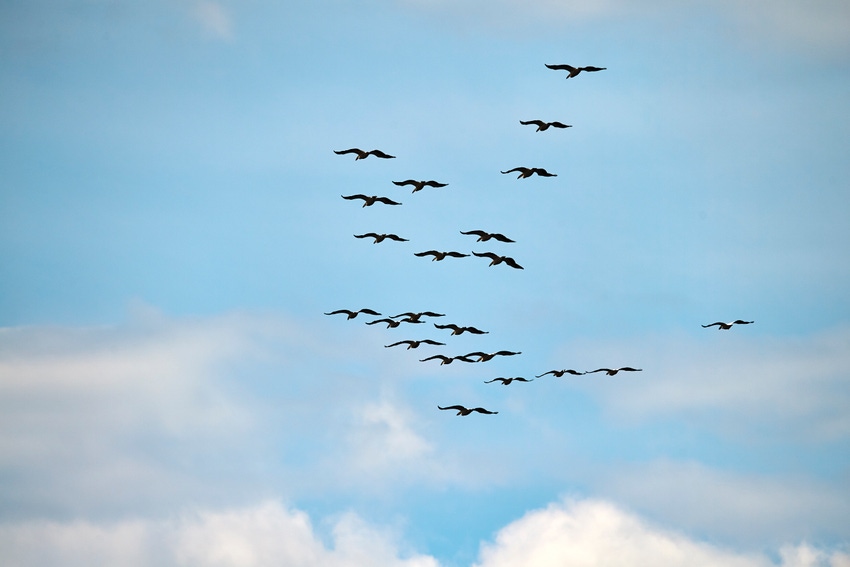South Dakota turkey operation ends HPAI respite
Detection is the first U.S. commercial case in nearly three weeks.

The U.S. Department of Agriculture's Animal & Plant Health Inspection Service (APHIS) has reported the first commercial case of highly pathogenic avian influenza (HPAI) following a nearly three-week respite. The virus was confirmed on a commercial turkey operation of 31,200 birds in Hutchinson County, South Dakota. On Feb. 23, APHIS had reported the virus in a laying flock of 20,300 birds in Dallas County, Missouri.
Early December was the last time South Dakota had reported finding any large commercial poultry operations with the virus, although several upland gamebird operations contracted the virus from mid-December to late January.
Ramp up biosecurity for spring migration
As spring migration gets underway, extension specialists in neighboring North Dakota say now is the time for poultry and bird owners to ramp up biosecurity efforts.
“One of the first clinical signs of HPAI is sudden, unexplained death,” said Dr. Gerald Stokka, North Dakota State University Extension veterinarian and livestock stewardship specialist. “Most HPAI cases are reporting a decline in water and feed consumption prior to the unexplained death.”
Decreased egg production and depression in layers may be another sign that birds are not feeling well. Purple or dry combs, being quieter than normal, frequently lying down and swelling around the eyes are other symptoms birds may experience.
“The best way to reduce the potential for transmission of HPAI is to reduce interaction between wildlife and domestic flocks,” said Stokka. “Wild birds and mammals, such as foxes, coyotes and raccoons, are transmission vectors to your domestic flocks.”
NDSU Extension specialists have developed tips for reducing transmission of HPAI.
To reduce transmission between wildlife and domestic birds:
If possible, keep poultry housed until the risk for transmission has decreased. Non-lethal methods to deter wildlife are available on USDA’s wildlife damage webpage.
Reduce the attractiveness for wildlife to stop by cleaning up litter and spilled feed around your domestic flock's housing.
If you come in contact with or handle wildlife, change into clean clothes, wash your hands and disinfect your footwear prior to contact with domestic flocks.
Report sick or deceased wildlife.
In the event that handling carcasses is necessary, be sure to follow the appropriate procedures.
“The best defense against HPAI is having a biosecurity plan in place,” said Mary Keena, NDSU Extension livestock environmental management specialist. “It is your job as a flock owner to create a line of separation between your clean flock and the potential unclean issues that wildlife or visitors may bring.”
To reduce transmission between domestic flocks:
Keep your distance. Restrict access to your property and your flock. Allow contact from people who care for your birds, but minimize visitors.
Do not haul disease home. If you have been near other poultry or bird owners, such as at feed stores, clean and disinfect car and truck tires. New birds should be kept separate from your flock for at least 30 days.
Do not borrow disease from your neighbor. Do not share lawn and garden equipment, tools or bird supplies with your neighbor or other flock owners.
More information about biosecurity can be found on the USDA Defend the Flock Resource Center webpage.
“Poultry testing positive for HPAI are prohibited by law from entering the marketplace,” said Miranda Meehan, NDSU Extension livestock environmental stewardship specialist. “Poultry and poultry products are safe to eat, and proper handling and cooking is always advised.”
About the Author(s)
You May Also Like





